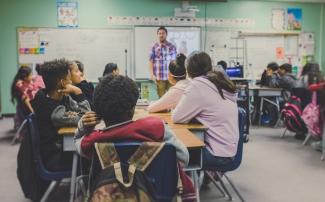
Texas Teachers Consider 403(b) plans
If you are a public-school employee in Texas, you must participate in the Teachers Retirement System (TRS), a defined benefit pension plan. But did you know that as a supplement to TRS, a 403(b) plan is a tax-deferred retirement savings plan offered to public school employees through their school districts or open-enrollment charter schools? Like 401(k) plans in the private sector, employees can make contributions to 403(b) plans on a pre-tax basis. Employers direct these contributions to specific 403(b) investment products selected by each employee from among the options available in their district or charter school.[i]
The problem and solution
Experts estimate that you will need at least 70 to 90% of your pre-retirement income to maintain your standard of living in retirement.[ii] The average TRS pension benefit only replaces 69% of a member’s pre-retirement income, an amount unlikely to be enough to support a comfortable retirement for our hard-working Texas teachers. Most Texas school employees can expect to receive $0 from Social Security since 96% of Texas school districts do not pay into Social Security.
As you can see, there is a gap between the amount of income provided by the average career employee's TRS pension and the minimum amount of income you will likely need to live a financially comfortable retirement. To increase the income available to you in retirement, you will need to supplement your TRS pension with your own personal savings. One way to save for retirement is in a 403(b) plan. Participating in a 403(b) plan gives you a valuable opportunity to supplement your TRS pension with tax-advantaged savings. Contributing to a 403(b) plan as early as possible is a smart choice for Texas teachers.[iii]
What is a 403(b) plan?
With a 403(b) plan, contributions are deducted from your paycheck on a pre-tax basis. Taxes on your 403(b) contributions are deferred until you begin making withdrawals, typically upon retirement. Before opening a 403(b) account, you should talk to a financial advisor to explore the options available to you.
New Issues to consider
An interesting twist as of September 1, 2019, TRS no longer certifies 403(b) companies or maintains a list of registered 403(b) investment products. This change is a result of new legislation that was adopted by the Texas Legislature in May 2019. This measure eliminates the need for financial firms to register products with the Teachers Retirement System. It also removes the caps on expense fees that had provided some protection for teachers for nearly two decades.[iv]
Under the old system using the list, teachers could see lower-cost alternatives on the TRS website. Product expenses were also capped at a very high 2.75% a year. With the new law, while lower-cost mutual fund firms like American Century, American Funds, Fidelity and Vanguard are added to the list, insurance firms with high expenses dominate it.[v] This can be very problematic for teachers in that they already have an annuity in the TRS pension and they could be getting an additional high priced annuity, rather than getting a low-cost index fund. Years of academic research show the importance of having a well-diversified investment portfolio with low costs.
Texas teachers need to be more careful than ever with decisions about their retirement plans. There are now concerns that a new state law that few people know about makes teachers’ 403(b) plans riskier than before.[vi] This may seem confusing, but it doesn't have to be. It is strongly advised that you speak to a financial advisor to learn more about the steps you can take if you are a Texas public school employee and what investments are right to fund your retirement.
*This content is developed from sources believed to be providing accurate information. The information provided is not written or intended as tax or legal advice and may not be relied on for purposes of avoiding any Federal tax penalties. Individuals are encouraged to seek advice from their own tax or legal counsel. Individuals involved in the estate planning process should work with an estate planning team, including their own personal legal or tax counsel. Neither the information presented nor any opinion expressed constitutes a representation by us of a specific investment or the purchase or sale of any securities. Asset allocation and diversification do not ensure a profit or protect against loss in declining markets.
[iv] https://www.dallasnews.com/business/personal-finance/2019/09/15/new-texas-bill-means-teachers-could-be-better-off-saving-in-a-roth-ira-than-a-403-b-plan/





